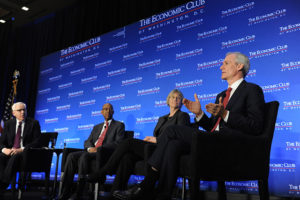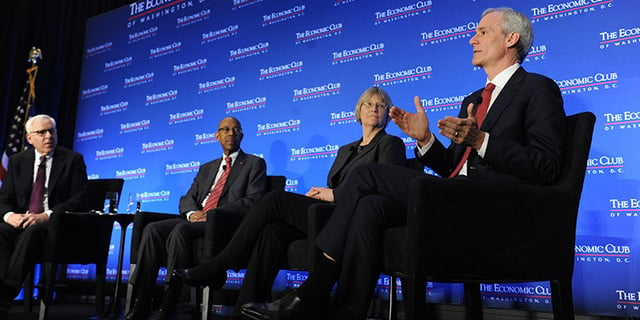At Thursday’s Faculty Senate meeting, Stanford President Marc Tessier-Lavigne reiterated the University’s continual support of federal funding for research. The Vice Provost for Undergraduate Education (VPUE) and the Vice Provost of Graduate Education (VPGE) also took a look at the future of undergraduate and graduate education.
Tessier-Lavigne debriefed the Faculty Senate on his recent visit to Washington, D.C. with other presidents of the Association of American Universities’ (AAU). Stanford is one of 62 university members. During this trip, Tessier-Lavigne met with senators on both sides of the political spectrum to discuss research funding.
“Federal support of research is a bipartisan issue,” Tessier-Lavigne said.

the Faculty Senate heard President Marc Tessier-Lavigne speak on federal funding for research (Courtesy of Joyce N. Boghosian)
He also joined other leaders of AAU institutions in a statement calling for Americans to urge greater federal collaboration with universities.
“We call on every American who cares about the welfare, security and prosperity of our nation to join us in urging our nation’s leaders to renew and strengthen this partnership,” the statement reads. “Our economy depends on our ability to create the technologies, cures and jobs of the future.”
Provost Persis Drell followed with comments about recent concerns regarding academic freedom at Stanford. Drell said that Stanford cherishes academic freedom and works hard to protect it; however, to preserve Stanford as a place to encourage diversity in thought, Stanford members are not allowed to act on behalf of the University or utilize University resources to support particular political candidates.
Examples of this include holding rallies to defeat or support a particular candidate, fundraising for a candidate and sending out mail urging voters to vote for a specific candidate through Stanford mailing lists.
The Faculty Senate also heard from Vice Provost of Graduate Education Patricia Gumport, who provided updates on the state of graduate education and priorities for the future. One point of concern, she said, is the large increase in graduate enrollment in recent years; between 2002 and 2016, the the graduate population grew by 22 percent, while the undergraduate population increased by only 4 percent.
“What we have here is a path of unplanned growth,” Gumport said.
Other issues include funding, adequate advising and strengthening diversity and inclusion, as well as collecting more data to understand the complexity of graduate student life.
Gumport particularly emphasized the need for data, noting that there is little University-wide data on critical aspects of the graduate population, in part due to the decentralized nature of the community. Faculty Senate Chair and Marta Sutton Weeks Professor of Ethics in Society Debra Satz urged extra support in obtaining data.
Vice Provost of Undergraduate Education Harry Elam also presented a “forward-thinking” look at undergraduate education and called for faculty to submit proposals to Stanford’s long-range planning initiative, dubbed “The Purposeful University,” to reform the freshman year experience, major paths and other academic issues. Elam particularly noted the importance of the student perspective in the long-range planning process.
Other areas that need particular attention, he said, include rethinking liberal education and condensing requirements and unit counts for certain majors to allow for greater intellectual exploration.
Contact Christina Pan at capan ‘at’ stanford.edu.
